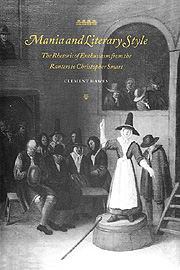Book contents
- Frontmatter
- Contents
- Acknowledgments
- Introduction: Mania as rhetoric
- PART I DEFIANT VOICE
- PART II PATRICIAN DIAGNOSIS
- PART III CHALLENGING LIMINALITY
- 5 Scribe-evangelist: popular writing and enthusiasm in Smart's Jubilate Agno
- 6 Double jeopardy: the provenance and reception of Jubilate Agno
- 7 Smart's bawdy politic: misogyny and the second Age of Horn in Jubilate Agno
- 8 Smart's poetics of place: myth versus utopia in Jubilate Agno
- Epilogue: Beyond pathology
- Index
- CAMBRIDGE STUDIES IN EIGHTEENTH-CENTURY ENGLISH LITERATURE AND THOUGHT
5 - Scribe-evangelist: popular writing and enthusiasm in Smart's Jubilate Agno
Published online by Cambridge University Press: 16 September 2009
- Frontmatter
- Contents
- Acknowledgments
- Introduction: Mania as rhetoric
- PART I DEFIANT VOICE
- PART II PATRICIAN DIAGNOSIS
- PART III CHALLENGING LIMINALITY
- 5 Scribe-evangelist: popular writing and enthusiasm in Smart's Jubilate Agno
- 6 Double jeopardy: the provenance and reception of Jubilate Agno
- 7 Smart's bawdy politic: misogyny and the second Age of Horn in Jubilate Agno
- 8 Smart's poetics of place: myth versus utopia in Jubilate Agno
- Epilogue: Beyond pathology
- Index
- CAMBRIDGE STUDIES IN EIGHTEENTH-CENTURY ENGLISH LITERATURE AND THOUGHT
Summary
For I am the Lord's News-Writer – the scribe-evangelist…
Christopher Smart, Jubilate Agno, B 327Eighteenth-century enthusiasm has provided the terrain for a classic debate among historiographers: namely, whether or not the Methodist revival somehow inhibited a second English revolution on the French model. Historians thus disagree as to the extent to which Methodism can be understood as the containment of an older and more radical tradition. As is well known, the eulogy delivered at John Wesley's funeral “stressed the leavening influence of Methodism in a politically restive situation,” implying that Wesley had helped to prevent revolution. Methodism can thus be seen as little more than a massive cooptation of plebeian energy for conservative and disciplinary purposes. A usefully nuanced contribution to this debate emerges in the historiography of Bernard Semmel, who emphasizes the ways in which Methodism did nevertheless produce significant popular reforms. What Semmel stresses is, above all, the supple and fence-straddling nature of mid-Georgian evangelical enthusiasm:
The Methodists saw themselves not as a danger to the established order, but as a catalyst for evangelizing and revitalizing what was widely regarded as a sluggish church, more and more given to the preaching of a flat “enlightened” religion, while at the same time shielding the state from the unsettling effects emanating from the preaching of religious Enthusiasm. That they were largely successful in this was in a good part a consequence of their ability to make the appeal and wield the discipline of both sect and church.
- Type
- Chapter
- Information
- Mania and Literary StyleThe Rhetoric of Enthusiasm from the Ranters to Christopher Smart, pp. 129 - 154Publisher: Cambridge University PressPrint publication year: 1996



